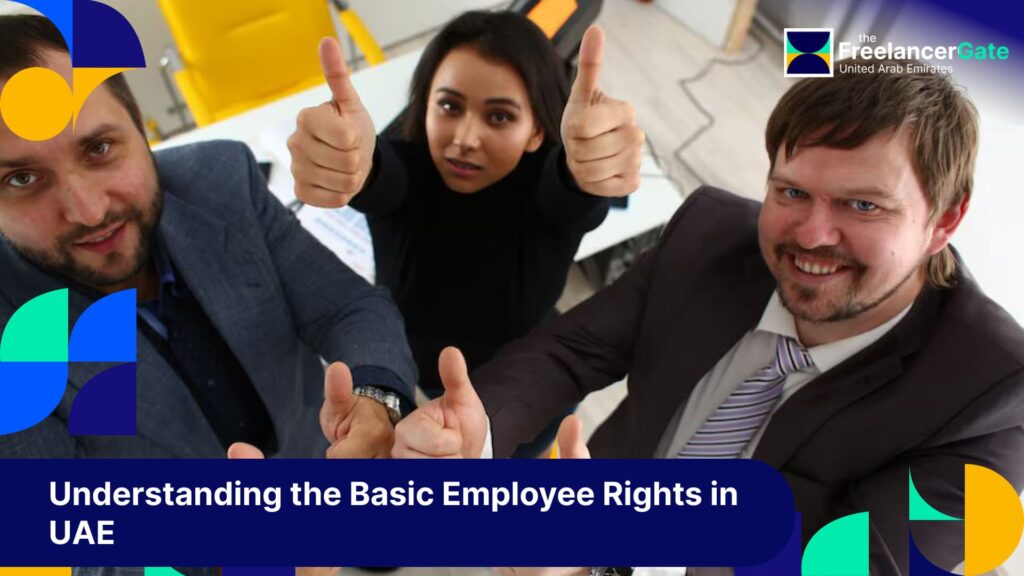Many people around the world want to work for a company in the United Arab Emirates (UAE). The reason is simple, this country is one of the richest in the world and offers many job opportunities. If you are one of these people, it is important that you know all the employee rights in UAE, and how to exercise and protect them. A good option is to go to a staffing agency uae, they will give you support to find an excellent job.
In this article, you will see a comprehensive guide to understanding employee rights in the UAE, according to current legislation. If you follow this simple guide, you will be able to work with more security and confidence in the country. All workers can exercise more calmly and ideally, if they know what their basic rights are. And not only that but also how to make them count. It is important to take into account that regardless of whether you are contracted with an agency temporarily termed as temporary staffing services, the conditions must be the same. In addition, you can avoid problems or misunderstandings with the authorities or with your employer.
What Are Employee Rights in the UAE?

The main reason for labor rights is to respect the cultural, moral, and economic. The UAE government is a member of the Arab Labor Organization, International Labor Organization, and other organizations. For this reason, the UAE seeks to work transparently and objectively regarding its international labor obligations.
The UAE government has ratified nine major ILO conventions on workers’ rights. In addition, they have been in charge of adopting various laws so that employment rights in the UAE can be protected. You can find these laws even in the different areas of hiring, remuneration, health, and housing.
In the UAE more than 7 million foreign workers are working in some 260,000 organizations. In this way, almost 200 countries are found, which reveals that 90% of the private sector workforce is thanks to foreigners. Additionally, in UAE, you work constantly so that the capacity to protect the rights of employees can be strengthened.
On the part of the Ministry of Human Resources and Emiratization of the UAE, various reforms were introduced. The reforms are a benchmark in terms of transparency and compliance with different topics that are topics such as employment contracts and termination conditions. In addition, thanks to these reforms, workers and employers have access to greater flexibility and labor benefits.
Critical Aspects of Employee Rights
Some aspects are key to understanding the UAE labor law and that is why we explain those details here.
Working hours: The normal working day in the private sector consists of 48 hours a week and you have to work 8 hours a day. In addition, daily hours have the possibility of increasing to 9 daily hours. All of this is valid after receiving MoHRE approval. However, there are exceptions to this and they are government entities. In this case, the employees work 7 hours a day.
Overtime: Overtime is the hours worked outside the 8-hour daily schedule. In this way, the employee has a salary equal to the basic salary, and an amount of no less than 25% is added. On the other hand, if you make the overtime between 10:00 p.m. and 4:00 a.m., the increase can reach 50%. However, this will not apply to those employees who work shifts.
Holidays: All employees have a right to paid holidays for holidays. These holidays are Georgian New Year, Hjiri New Year, National Day, Martyrs’ Day, Prophet Muhammad’s Birthday, Eid Al-Fitr and Arafat, and Eid Al Adha.
Annual vacations: Employees have the right to annual vacations and they are divided in two ways. The first is 2 days per month if you complete six months of service, but it is less than one year. On the other hand, there are 30 days of annual vacation upon completing a full year of service.
WPS protection system: The WPS is key to guaranteeing the rights of employees and building trust between companies and their employees. According to WPS, salaries will be transferred to employees’ accounts in banks that are authorized by the Central Bank of the UAE. Also, it is important to know about the mandatory WPS registration for companies.
Termination and Employee Rights
When you talk about terminated employee rights in UAE, certain important things must be taken into account. The first thing is about notifying employees about the termination of their employment and what the notice period is. In this way, the contract establishes the notice period in writing and it will be the employer who notifies the employees that their employment will end.
Additionally, during the notice period, the employer may place the employee on garden leave. On the other hand, the employer has every right to fire his employee at any time. However, to do this, the employer must respect the prior notice and its terms. The approach to dismissal is done by informing the employee about the termination of their services in writing.
The termination can be made by email, WhatsApp, or another method that can prove that the employee knows the dismissal. On the other hand, the employee has the right to claim compensation for arbitrary dismissal and their corresponding labor fees. However, if there is a problem with these payments, the employee can file a complaint with the Ministry of Labor.
If the parties can resolve this issue without going through this process, they may do so. However, if they continue with this problem, they should go to the corresponding government entities to deal with these problems. In addition, the employer must cancel your employee’s work permit and work visa.
Termination of Employment: Your Rights in the UAE
The Rights of an Employee in UAE establishes rules and procedures that must be followed by both the employer and the employee. For this reason, when terminating a work contract, these rights must be taken into account.
- To end a contract, the cause can be arbitrary or with a justification and everything will depend on the employer.
- Generally, the termination of a contract is notified with a notice period of no more than 90 days and no less than 30 days. However, this period may change if agreed between the parties or if either party commits a serious fault.
- The employee must have the right to receive their full salary throughout their notice period. In addition, you must receive your compensation for the termination of your services, your vacations that were not enjoyed, repatriation expenses, and another right that is established in the contract.
- The employee can waive his notice period if he wishes. All this if the employer fails to comply with any obligation or if he suffers any moral or physical damage.
- If the employee considers it necessary, they can challenge the termination of the employment contract in court
Protecting Employee Rights When Terminated in the UAE
The rights of an employee in the UAE at the end of their employment will depend on the type of contract they have, the causes of their termination, and what conditions are in their contract. For this reason, we will present some of the rights that an employee may have upon termination of their contract.
- You must receive regular pay until the last day you work for the company.
- You have the right to compensation for dismissal or the end of the contract.
- If you have unused vacations or overtime worked, you must receive compensation that complies with the provisions of the law.
- You may receive a letter of recommendation or no objection.
- Until you find another job or leave the country, you can keep your residence visa.
- It has access to the resources and institutions available so that it can resolve any labor conflict or if it wants to claim any rights.
- You can have additional benefits as long as they are in your employment contract.
Legal Framework for Terminated Employee Rights in the UAE
For the rights of employees who were laid off in the UAE, there is a legal framework that is made up of different sources. The first of these is the UAE constitution, which recognizes the right to work and social protection for all employees. In addition, we find the Federal Labor Code of the UAE, where working conditions, contracts, rights, and all the obligations of the parties are regulated.
This code even regulates the procedures for the termination of any employment relationship. The UAE government has ratified many international conventions. Among them, the International Labor Organization (ILO) stands out, which establishes the fundamental principles and rights at work.
It is important to note that the specific laws and regulations of each emirate may supplement or modify the Federal Labor Code in certain aspects. In addition, we found that in individual or collective labor contracts there may be additional clauses.
In this way, these sources are the ones that make up the entire legal framework that is responsible for protecting the rights of dismissed employees. However, this may change according to special situations. For this reason, it is recommended that you consult with an expert in labor law about any problems that may arise.
Family-Centric Employee Rights: Maternity and Beyond
Within the employee rights in UAE are those of the workers who will be mothers. That is, they are in the gestation or pregnancy period. In this case, they are beneficiaries of maternity leave. In principle, it gives private sector employees the right to 45 days with full payment of their salary. This includes the time before and after the birth.
On the other hand, the workers who are part of the Dubai International Financial Center (DIFC) have a different maternity leave. It is even considered a little better compared to the private sector. The minimum in this case is 65 days of leave, which has a specific distribution. The first 33 days have a full salary, but the other 32 remaining days only have 50% of the salary.
Another UAE employee right that female employees have is lactation leave. It is granted to all workers who have given birth and need to breastfeed their children during working hours. This leave, like maternity leave, varies depending on the sector and the emirate. According to article 31 of the federal labor law, in the private sector, female employees are entitled to two hours of lactation leave a day. This is during the first 18 months after the birth.
According to Decree No. 14, in the Dubai government, women workers are entitled to two hours of nursing leave a day; but, in this case, it is during the first 24 months after delivery. Finally, DIFC employees also have different rights. They have one hour a day for a duration of 12 months or 1 year after giving birth.
Employment Law in Dubai: A Legal Overview

The rights of employees are found in the employment law of Dubai. In turn, this is governed by the federal law of the UAE. Which applies to all employees and employers working in any of the seven emirates. In addition, the Federal Ministry of Labor in the UAE is in charge of all these laws.
Currently, the law has a modification with Federal Decree Law No. 33 of 2021. Which is in force since February 2, 2022. The mission of this is to improve Federal Law No. 8 of 1980 in different aspects. Among the most important aspects are employees’ rights. In addition, it increases the country’s competitiveness as a place to live and work. Thus, the region manages to attract and retain world-class talent in all areas.
There are very relevant changes that you will find in this new labor law. The first is the extension of maternity leave and especially paternity leave. In addition, new work modalities are introduced that support the comfort of employees and the productivity of companies. For instance, teleworking and flexible work.
On the other hand, there are changes regarding gender equality. Because the prohibition of wage discrimination based on gender is established. In addition, it implements the regulation of part-time work and hourly work. Another interesting reform is the protection of domestic workers and the establishment of social security for private sector employees.
It is important to note that in the labor law, you find all the employee rights in UAE. Among the most important is the right to receive all salaries, severance pay, and annual vacations. In addition, foreigners must receive plane tickets at the end of their employment contract.
Demystifying Sick Leaves: Your Employee Rights in the UAE
Within the employee’s rights in UAE, you can find different licenses to which you have access. One of them is on sick leave. Every employee has the right to make use of sick leave, if necessary. Which consists of a maximum of 90 days, for each year of service, which can be consecutive or intermittent. Of course, as long as the employee is no longer on probation.
Before taking this leave, the employee must notify the employer of his illness. You have a maximum of 3 days to do this. In addition, you must go to a recognized medical entity to issue the medical report on your condition.
If the employee does not submit the medical report, the employer may consider his absence unexcused. Therefore, you can take appropriate disciplinary measures. For instance, if it is a long time, fire him or deduct part of the salary. For this reason, it is of the utmost importance that employees obtain a certificate of sick leave. This certificate has a value of 60 dirhams in Dubai, it may vary in the other emirates.
On the other hand, the employee must keep a record of all periodic medical examinations. Not only that, you must also keep a record of your exposure to occupational hazards. This is for a minimum time of 5 years at the end of their services or the end of the employment contract.
If you meet all the requirements, you will be granted sick leave. The calculation of this leave is the first 15 days the employee will have full salary, but for the next 30 days, it will be half the salary. Finally, the last remaining days will not have a salary.
Navigating Sick Leave Rights Under UAE Employment Law
The first thing you need to know is that Article 31 of the United Arab Emirates Labor Law governs sick leave. Which establishes and exposes the obligations and rights of employers and employees with this type of permit. It is important to note that this leave applies to both public-sector and private-sector employees. However, there are some differences regarding duration and payment.
Among the most important employees’ rights in UAE is access to a special paid leave. This only applies if the employee contracts an occupational disease or suffers a work injury. Federal Law No. 33 of 2021 is the one that establishes this permit on Labor Regulation in federal entities.
On the other hand, you should know that any employer can terminate an employment contract if it exceeds 90 days due to sick leave. If an employee goes through this situation, they will not be able to return to work in that company. You will have the right to receive your respective severance pay and compensation for the days of leave you did not use.
Another point that is important to highlight is that an employer can request the employee to undergo a medical examination. This is in order to verify your health condition and your ability to work. In addition, you have the right to challenge a medical report from a worker through a competent medical committee.
On the other hand, you should know that sick leave does not apply if the cause of the illness is drug or alcohol use. Nor will it be valid if it is due to imprudent behavior of the employee inside or outside the workplace.
Understanding Leave Entitlements and Employee Rights
It is important that you understand all the employee rights in UAE and the benefits of leave. Thus, you will be able to comply with labor law and take care of labor relations. The first thing to know is that private sector employees have an annual leave of 30 calendar days. Of course, the employee must have a minimum of six months of service in the company.
In addition, you can accumulate the annual permit for up to a maximum of two consecutive years. The employee can request payment in cash for the days that he is going to use. On the other hand, workers also have access to different licenses per year. Of course, you must complete the trial period, otherwise, you would lose this right in its entirety.
One of the newer permits that exist in the country is the parental right. This grants parents with newborn children five working days with a full salary. It is important to note that this will be possible as long as they are within the first six months after the birth of the child.
Another interesting permit is the death permit. If the employee suffers the death of a spouse or first-degree relative, they are entitled to three working days leave with full pay. When saying, first-degree relatives are parents or children.
On the other hand, all Muslim workers who have at least one year of service for the employer have a special permit. This lasts for a maximum of 10 days and the employee will receive the full salary. The purpose of this license is to perform Hajj once in your working life.
Finally, all employees are entitled to paid leave on official holidays. That is the holiday that the government establishes at the beginning of each year.
Leaves and Absences: Employee Rights
Within the employee rights in UAE for private sector workers, you find various types of leaves and absences. The Federal Decree Law No. 33 of 2021 on the Regulation of Labor Relations in the Private Sector, details the licenses. Some of these are.
- Annual Leave: Employees with more than six months of service have access to annual vacations. The duration of this leave will depend on the level and seniority of the employee.
- Sick leave: Employees who have more time than the probationary period may request a maximum of 90 days of sick leave. This salary is paid as follows: during the first 15 days the full salary is paid, the following 30 days half the salary and the rest of the days, there is no salary.
- Official leaves and vacations: Private sector workers can request at least one day off per week. Each company has the power to increase the number of weekly rest days. In addition, each worker can request paid vacation on vacation. For instance, New Year, Eid Al Fitr, Eid Al Adha, and more.
- Emergency leave: This leave is the time off work that the employee can take for real and unforeseeable emergencies. It is important to note that it is true that, in the United Arab Emirates, this time is legal, however, there is no guarantee that during this period you will receive a salary. Furthermore, there are no explicit rules or guidelines on generic seizures under the legislation.
Decoding Employment Law in Dubai: Your Rights as an Employee
Employee rights in the UAE is a broad topic that covers many important and interesting aspects. Especially, of the employment relationship between the employee and the employer of the private sector. You can find all this in the Labor Law, which applies to all workers working in the UAE. That is both foreigners and nationals. Next, you will see some of the most important ones.
Trial period: It lasts for a maximum of six months. During the trial period, both the employee and the employer can terminate the contract without notice or compensation.
Salary: The employee must receive his salary at least once a month. The salary must be equal to or higher than the minimum salary established by the Ministry of Human Resources and Emiratization (MOHRE). It is essential to mention that without the consent of the employee, it is forbidden to reduce the salary.
Social security and pension: All employees must have access to social security and a pension according to current laws. Additionally, all employers must provide adequate health insurance for workers and their dependents.
Protection against discrimination and harassment in the workplace: Labor law prohibits any type of discrimination. That is, by gender, race, color, religion, origin, or disability. In addition, it prohibits any form of verbal, physical, or psychological harassment that has the consequence of affecting the performance or dignity of the employee.
Termination of the contract: There are several reasons for this, it can be due to expiration, resignation, mutual agreement, or dismissal. Every employer must receive a layoff notice at least 30 days in advance.
In-Depth Exploration of Dubai’s Employment Legalities
The new Labor Law regulates all employee rights in the UAE and, in turn, the duties of employees and employers. Especially those belonging to the private sector, both foreign and national. Within the labor legalities that exist for workers in the private sector, the following can be highlighted.
- Elimination of the need for an employer sponsorship and a work permit to work.
- Introduction of a national minimum wage for all workers.
- Expansion of existing leaves and the possibility of requesting leaves without pay for different reasons.
- Simplification of judicial procedures, in case of labor disputes.
Legal Safeguards: Employees’ Rights According to Dubai Employment Law
The employee rights in UAE and the legal guarantees under Dubai labor law are as follows.
- Employment contract: All employees have the right to a written contract. This contract must have a prior agreement between both parties. This must specify the duration, trial period, salary, benefits, and responsibilities of the worker.
- Minimum wage: The Ministry of Human Resources and Emiratization (MOHRE) has the function of establishing a minimum wage. The employee must receive the salary once a month.
- End-of-Service Severance: Workers must receive severance pay. The amount must be equivalent to 21 days of salary for each year of work for up to five years. In addition, for each additional year, 1 month of salary must be added. This compensation is calculated on the basis of the employee’s last salary.
- Complaints and claims: All employees have the right to file claims or complaints with MOHRE or the competent courts. This is whenever there is a violation of the labor rights of workers. MOHRE offers digital services to provide dispute resolution.
FAQs
What rights do UAE workers have against unfair decreases in wages or late payments?
The law specifies that deductions can’t be over fifty percent of an individual’s wage. The payments must be made through the Wage Protection System within fifteen days of the due date. There are penalties for being late.
What legal rights do UAE workers have if their employer takes their passports?
Employers can’t keep a worker’s passport without their permission. MOHRE can take action right away if employees report this infringement to them.
Should a worker refuse to work overtime? What are the laws in the UAE for labor protection for forced overtime?
An employee can refuse overtime, unless it is required to avoid a significant financial loss. The law specifies that pay must be 125 percent of the basic hourly rate.
What rights does a worker have if their employer ends the contract without sufficient cause under the UAE labor law?
The worker may register a complaint with MOHRE if they were fired for no legitimate reason. If the case is substantiated, the court may order the employer to pay a maximum of three months’ full salary and gratuity.
What can UAE workers do legally if they are being harassed or discriminated against at the workplace?
The law indicates that bullying, abuse, harassment, and discrimination are all against the law. If the employer fails to act, workers should report it to the organization, keep records of the evidence, and submit a written complaint to MOHRE.
What rights do UAE workers have during their probationary period, resignation, and notice?
Employers must offer fourteen days’ written notice before terminating a worker. Workers must give fourteen days’ notice before leaving the UAE. They also need to give a full thirty days before starting work for a new UAE employer.






